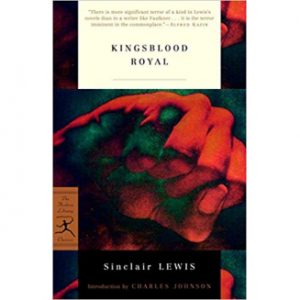In the old days when I attended high school, Sinclair Lewis was a mainstay in English classes, and we read Main Street and Arrowsmith. I thought of Lewis as a chronicler of mainstream American life, a life different from what I knew growing up in the Bronx. Just like TV shows such as Father Knows Best and Leave It to Beaver portrayed families that I took to be normal American families that were different from my own, I thought of Lewis as portraying the real America and that I was experiencing something less genuine.
I don’t think I was completely oblivious to the satire in his novels, but it wasn’t till later, when I read him as an adult and became acquainted with It Can’t Happen Here and Elmer Gantry that I realized that Sinclair Lewis was less a chronicler than a critic of American culture. When I read Kingsblood Royal for the first time, earlier this year, my estimation of him as a critic, and a very prescient one, was confirmed.
The novel is about Neil Kingsblood, an up-and-coming young banker with solid middle-class credentials in post WWII Minnesota. He looks into his genealogy because his father suspects a family connection to the English throne. What his research ironically turns up is that one of his ancestors may, in fact, have been a black man. He is at first shocked by this discovery and keeps it secret. Gradually he he becomes curious about the black people in his community and meets several of them, finding out that some of them are finer people than many of his white acquaintances. As someone with as much as 1/32 Negro blood, Kingsblood is marked as a black man when he reveals his secret, and eventually loses his job, status and house because of it.
Lewis’s selection as the first American recipient of the Nobel Prize for Literature is sometimes treated as a travesty. Admittedly he doesn’t stand out stylistically, but his depictions of people, descriptions of places and plot handling are inferior to none. What adds to his stature as a novelist is his real understanding of people and his determination to write about things that matter, regardless of the popularity of the topic. It’s a real eye-opener to read Lewis’s 1947 novel about racial attitudes in 2018. His novel isn’t set in the deep South but in the most progressive region of the Midwest, and what Lewis exposed more than 70 years ago we now have the misfortune to be experiencing in our own times.
Kingsblood Royal
by Sinclair Lewis
Book Details from Amazon
|


